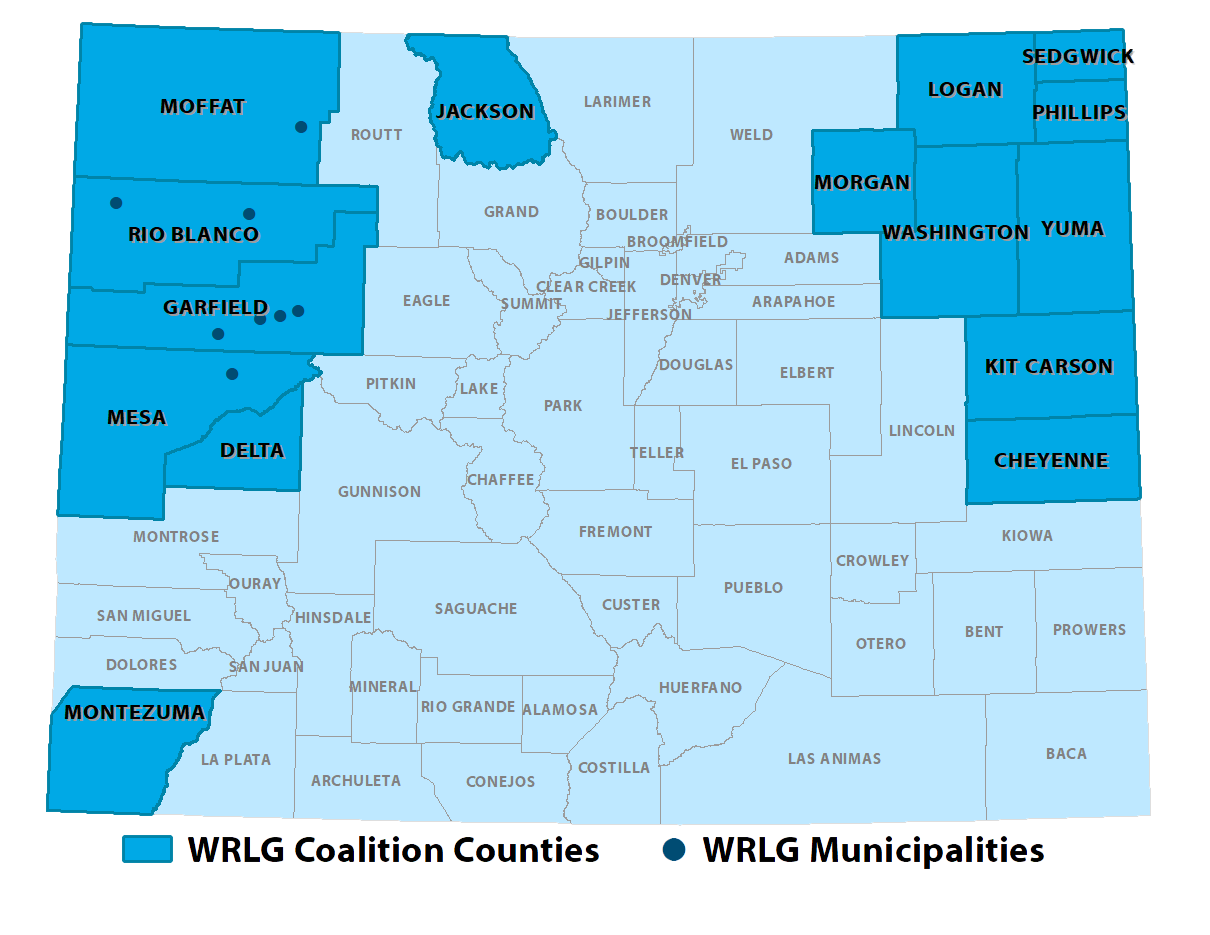Western and rural local government coalition
Who we are
In 2020, WRLG participated as a party in the Colorado Oil and Gas Conservation Commission’s (COGCC) and the Air Quality Control Commission’s (AQCC) Senate Bill 181 Mission Change rulemaking processes. WRLG collaborated with stakeholders, filed written materials including written testimony and proposed rule language, and testified at each of the rulemaking hearings. Our coalition worked to bring attention to areas where urban vs. rural or DJ Basin vs. Piceance specific rule provisions are needed to account for the very different geology, technology, topography and operational practices in Western Colorado natural gas basins.
Ultimately, this coalition has come together to provide an ongoing rural voice for the public welfare, environmental concerns and economic viability of our communities.


Western and Rural Local Government Coalition (WRLG)
By representing nearly a third of Colorado’s land area, and living in communities that value clean air and environmental protection policies, our goal is to provide a viable and united voice for Colorado’s less populous areas outside of the Front Range.
MISSION CHANGE OUTCOMES
Through WRLG’s efforts, our 23 counties and municipalities had a strong, unified voice for our western and rural Colorado communities. Ninety-seven (97) named parties participated in the Mission Change rulemaking process, and WRLG was a formidable voice in the crowded field.
- WRLG collaborated with stakeholders and our elected officials to file written materials, backed by data in support of specific language revisions and rule changes.
- Similarly, our coalition members presented oral testimony at each of the COGCC and AQCC public hearings, providing western and rural perspective and opinion to balance out testimony from activists and special interests, including urban Front Range governments in those public hearings.
- In several cases (outlined below) our efforts to have western and rural Colorado community voices heard resulted in distinct edits to Mission Change rule language, while others resulted in modifications to language that better serves all parts of the state.
- Some rule revisions WRLG championed ultimately did not result in material changes, however those efforts did result in a better understanding from the COGCC and AQCC of how western and rural governments approach a variety of issues in the oil and natural gas industries.
Diverse State & Local Decisions
Colorado is an extremely diverse state in numerous aspects from the East Plains to the Western Slope, with many unique needs and challenges for local governments to regulate and manage.
During the Mission Change rulemaking process, WRLG championed the co-equal authority of local governments as outlined in SB-181, which underscores the diversity that exists in Colorado.
- WRLG consistently made the reasonable argument that local governments are best informed and best equipped to make land use decisions within their jurisdictions based on variables including economic, cultural, current and planned land uses, environmental, wildlife, topographic, and geologic considerations to name a few.
- Thanks to our efforts, prior to an operator submitting an oil and gas development plan the COGCC Director will now participate in a Formal Consultation Process with the Relevant Local Government or federal agency and the operator.
- The Formal Consultation Process includes consideration of location siting, alternative location analysis, best management practices, conditions of approval, anticipated milestones and other events in the local as well as state and federal permitting process, opportunities for state collaboration in the local permit process and other related topics regarding the planned development.
- Ultimately, this rule change ensures the COGCC has the best information from local governments and federal agencies, enabling the Director to identify any potential conflicts, differences or concerns that may exist, eliminating potential duplicative efforts as well as potential conflicting rulings that are extremely costly to the taxpayer.
- WRLG was also successful in generating rule changes to be clearer about local land use decisions vs. decisions made by the COGCC, which will prevent confusion and related, unnecessary local government costs moving forward.
Other Mission Change Rulemaking Outcomes
Despite Colorado voters’ overwhelming rejection of a statewide setback ballot initiative in 2018 (Proposition 112), after all witness testimony was complete, the COGCC introduced a statewide 2,000-foot setback rule for occupied structures as a part of the Mission Change rulemaking. In several instances, WRLG successfully lobbied for critical variances, or “off-ramps” to some of the most stringent rules, including building setbacks and wildlife habitat buffers to account for the diverse nature of our state and the expertise and authority of local governments.
- Regarding the proposed 2,000-foot setback rule, WRLG’s initial ask was for a reduced setback as our members do not believe the scientific data supports such a distance. When it became clear that the Commission would adopt a 2,000-foot setback, WRLG successfully argued for numerous exceptions from this requirement. Through our testimony, exhibits and conferral with individual COGCC Commissioners and leadership, WRLG ensured the setback is “soft,” not “hard” as originally presented.
- As a result of our efforts, the commission will base setback decisions on the following, among other factors:
- Geological, technological and topographical considerations
Anticipated size, duration, and intensity of all phases of a proposed operation - The Relevant Local Government’s opinions on land use permits, including any siting decisions and conditions of approval identified by the local government
- The Operator’s engagement and consultation with nearby residents and businesses regarding planned oil and gas operations
- Geological, technological and topographical considerations
- Additionally, WRLG’s efforts were successful in:
- Requiring formal Commission hearings when a well is ordered to be permanently plugged
- Creating a “soft” rather than “hard” setback from Colorado’s rivers and streams and associated sensitive fisheries when an operator adheres to a specific list of Best Management Practices
- Updating language to remove “proximate local governments” from the definition of “affected persons” for a site plan, understanding that just because a site is located within 2,000 feet of an adjacent local government does not mean that government will be adversely affected by the plan.
- The original rules as drafted allowed the Commission to deny a permit if “in its judgement” the plan does not protect public health, safety, welfare, the environment and wildlife resources. WRLG asserted that language was arbitrary and vague and persuaded the Commission to include language in the final rules that establish specific criteria that must be met before the Commission can deny a permit.
- WRLG’s efforts repeatedly championed local governments’ role in making the best decisions for the areas they were elected to govern – including areas where local governments have existing oil and gas regulations that include an opportunity for a public engagement and comment.
WRLG Moving Forward
While our coalition of 23 rural county and municipalities banded together specifically for the Mission Change rulemaking process, our members plan to continue communicating about, and collaborating on issues that have an impact on less populated western and rural areas of Colorado. We are proud to have generated tangible and positive changes to the Mission Change rules and will continue to be a unified voice for Colorado’s western and rural communities.


